One of the most common questions I get via email or social media messages is: “Lily, am I too late to benefit from nutrition changes during pregnancy?”
Sometimes this is from a woman who didn’t find my writing until late in pregnancy or sometimes it’s from those who had a rough patch of nausea and food aversions that prevented them from eating as well as they had planned.
Regardless of the circumstances, I want to reassure you: No, it’s not too late to benefit from nutrition changes in pregnancy!
To give you a little more context, here are some actual messages that hit my inbox:
“I’m 24 weeks and just found your book, Real Food for Pregnancy. Am I too late to make a difference in my pregnancy if I change my diet now? I feel terrible that I didn’t know what I know now. My first trimester was especially a struggle. I ate so many more carbs than usual and couldn’t stomach a lot of my healthy staples.”
“I’m currently 27 weeks pregnant. I feel guilty sometimes when I remember the first trimester and how poorly I ate. Sometimes I wonder if I could potentially have caused something to the baby by eating wrong foods or not enough vitamins at that time (so far everything is ok with the baby but still I worry). I suppose the question I have is what impact can I still have on the baby’s development now that I’m already almost in 3rd trimester? What is still to be developed and what can I focus on in terms of nutrition at this point to feel like I am in control of positively impact my baby?”
“I’m 26 weeks pregnant and have THE BIGGEST sweet tooth. I feel like I can’t cut the sugar habit, but does it even matter at this point? Like isn’t the damage done?”
“I’m still sick a lot of the time and can’t tolerate a lot of nutrient dense foods, even well into the 2nd trimester. If I’m sick 5 days a week, does what I eat the other 2 days matter?”
“I had such strong food aversions during my first trimester. Now that I’m in my second, can I still apply the advice and will it still have any positive effects for my baby? I feel like the first trimester is the most crucial.”
As you can see, a lot of these messages center around guilt over the first trimester. If you’re in the thick of it — the nausea, the food aversions, the feeling of being in survival mode — you’re not alone. I actually wrote another article with a lot of first trimester tips and reassurance. Please give that a read and give yourself a pat on the back for making the best of the very real and very exhausting symptoms that commonly happen in the first trimester.
Back to the question…
Am I too late to benefit from nutrition changes during pregnancy?
The answer is: No, you’re not too late to benefit from nutrition changes during pregnancy! Not at all.
While there are no downsides (and arguably benefits) to eating healthfully earlier in pregnancy and even preconception, this does NOT mean that starting to eat healthy in pregnancy is “too late” to have any benefits.
You are never too late to change how you eat. You are never too late to add more nutrient-dense foods into your diet. You are never too late to work toward an easier, healthier pregnancy and postpartum.
Sure, some benefits have a time-specific threshold (like consuming sufficient folate to reduce the risk of neural tube defects in early pregnancy), however many benefits of a nutrient-rich diet persist through the entirety of the pregnancy. And you won’t see any of those benefits if you don’t start at all.
So no matter if you’re 6 weeks, 17 weeks, or 32 weeks, NOW is the perfect time to get started.
Even if you’re in week 39, eating nutrient-dense foods will support you in the transition from birth to breastfeeding to nutrient repletion (not to mention for the rest of your life and your family members’ lives). All of these phases require an increase in nutrients from the mother – nutrients that either have to come from a mother’s nutrient stores, or from the foods we eat.
In this article, I’ll show you just what I mean. Not only can you get benefits from changing your nutrition and lifestyle at any time, but some studies have actually waited until the third trimester to begin supplementation. After all, the increased needs for some nutrients sometimes starts later in pregnancy. Plus, some conditions in pregnancy don’t develop until halfway through gestation, yet can still be managed through nutrition.
Let’s dive in.
Increasing calorie and macronutrient intake as pregnancy progresses
You’ve heard the old adage that you need to “eat for two” during pregnancy. And while that’s not entirely true – your calorie needs in pregnancy don’t actually double – you do need to consume a bit more energy as your pregnancy progresses.
To consume more energy you need to eat more! Starting in the second trimester, daily energy needs in pregnancy gradually increase by about 300-500 calories. This is about the amount of energy in 1 to 2 well-balanced snacks.
While the specific calorie amounts help contextualize how much more to eat during pregnancy, the most important thing to focus on is simply making sure you’re not consuming too few calories. A study of calorie intake in Indian pregnant women showed that women whose calorie intake dipped below 1,500 calories a day had the highest prevalence (82.7%) of low birth weight babies. Remember, if you’re not eating enough food as a whole, you’re also likely not consuming enough vitamins and minerals.
When I run micronutrient analyses on clients’ diets, I most frequently see nutrient deficiencies when calories are falling below 1,800-2,000 calories a day. Most pregnant women need more like 2,200-2,600 calories per day.
While I don’t encourage calorie counting per se (I prefer mindful eating practices instead), sometimes a ballpark reference is helpful for individuals who are prone to undereating. You can also see the sample meal plans in Real Food for Pregnancy, which provide sufficient calories, protein, and micronutrients to supply optimal nutrition for pregnancy. If you’re tempted by it, know that pregnancy is most certainly not a time for intermittent fasting.
Another consideration with increasing your food intake is to make sure you focus on protein. Don’t sweat it if you weren’t able to eat a lot of protein earlier in pregnancy. Protein needs specifically increase in the latter half of pregnancy, which is usually at a stage when the nausea and food aversions are less severe. Higher protein intake in that stage of pregnancy is associated with healthier newborn growth parameters (height and weight).
No matter where you are in your pregnancy, when you start to make nutrition changes, first begin by making sure you’re feeding yourself enough. Aim for three balanced meals a day with snacks, depending on how you feel. Make sure that there’s a source of protein at each meal and snack! If you need examples, see the meal plans in Real Food for Pregnancy.
Some pregnancy conditions aren’t found until mid-pregnancy
I know that it’s not too late to change your nutrition in pregnancy, because I’ve seen hundreds of women make changes halfway through their pregnancies and beyond.
Some pregnancy conditions like gestational diabetes aren’t even typically diagnosed until mid-pregnancy (24-28 weeks). It’s at that point that many women take on changing their diets to manage their blood sugar — and there are benefits to this!
In a review of 12 randomized-controlled trials on gestational diabetes management, diet and lifestyle interventions resulted in 50% lower risk of macrosomia and large for gestational age babies (i.e. babies being born much larger than average) and 60% lower risk of shoulder dystocia (a birth complication where the shoulders get stuck in delivery). Both of these are well-known possible complications that result from poorly controlled blood sugar in pregnancy and this study showed a clear reduction in these complications thanks to diet and lifestyle changes.
One of the things people don’t always realize about blood sugar is that the negative effects of high blood sugar in pregnancy are proportional to blood sugar levels. This means that any changes you make to lower your blood sugar, even a little bit, helps to reduce adverse pregnancy outcomes (even if your blood sugar isn’t perfectly in range after every single meal).
This means that what you eat today for breakfast, lunch, dinner, and snacks are all contributing to optimal or not-so-great outcomes. Don’t get caught up in what you didn’t do earlier. Focus on the impact you can make NOW!
For more on managing blood sugar during pregnancy, check out my FREE 3-part video series on gestational diabetes or grab a copy of my book, Real Food for Gestational Diabetes. Don’t forget that I also run an online gestational diabetes course complete with a private Facebook community where I answer participant questions during weekly office hours. If you can’t find great professional support local to you, this is a great option.
Many studies supplement with micronutrients later in pregnancy
There are many studies, especially ones that focus on micronutrients, where researchers test the intervention in the third trimester. This is not to say that vitamin and mineral intake in early pregnancy don’t matter, but rather that there can still be benefits from improving nutrient intake later in pregnancy. Let’s look at some examples where nutrient supplementation in the third trimester improved pregnancy outcomes..
DHA
DHA is a type of omega-3 fatty acid that is critical for fetal brain and eye development. Yet, it can be hard to get enough of this nutrient if you don’t eat seafood regularly. One randomized controlled trial assessed the impact of adding DHA later in pregnancy.
They found that supplementing by 100 mg more per day of DHA (control group: 33 mg/day; DHA group: 133 mg/day) led to longer gestation by an average of 6 days in the DHA group. Birth weight, length, and head circumference also increased in the DHA group, but did not reach statistical significance.
Although there aren’t separate “official” recommendations for DHA intake based on the stage of pregnancy you’re in, it’s well known that DHA transfer from mother to baby is highest during the third trimester. During the last 3 months of pregnancy, an estimated 67 mg of DHA is transferred to baby every single day. This means that if you didn’t focus on DHA intake earlier in pregnancy, it’s not too late to benefit from getting enough of this key fatty acid now.
On average, women in the United States are eating less than 3 ounces of seafood per week. Ideally, this should be more like 12 ounces per week. In fact, research has shown that babies of mothers who eat 12 ounces or more of seafood per week have the best brain development outcomes.
Seafood is the best dietary source of DHA. Caviar, mackerel, salmon, tuna, oysters, mussels, and many other types of seafood are very high in DHA. Aim for 2-3 servings of seafood each week to help reach an optimal intake of DHA. If you’re not a seafood fan, there are plenty of supplements with DHA, too. Fish oil, krill oil, cod liver oil, or an algae-based DHA supplement are a few options. You can get a bit of DHA from other foods, like egg yolks and grass-fed beef, but those foods aren’t rich enough in DHA to be your sole source. For more on DHA, see chapters 3 and 6 of Real Food for Pregnancy.
Vitamin D3
Vitamin D is another micronutrient in which supplementation in later pregnancy has shown benefits. In one trial, 160 women between weeks 26-30 gestation were randomized to either get 35,000 IU of vitamin D3 per week (equivalent to 5,000 IU per day) or placebo.
Babies who were born from the vitamin D3 group had better growth (length-for-age scores) on average one month after birth compared to the placebo group. Throughout infancy, babies born from the vitamin D3 supplemented group continued to have better growth than the placebo group. For example, stunting affected only 17% of babies from the vitamin D3 group compared to 31% of babies in the placebo group.
A comprehensive analysis of 45 years of data on vitamin D intake in pregnancy and childhood growth confirmed these findings: supplementation of vitamin D in pregnancy is associated with better growth in children. This likely is related to the effects of vitamin D on bone health as well as its impact on hormone levels. As you can see, just increasing vitamin D3 later in pregnancy has lasting effects through infancy and beyond.
While I advocate for improving vitamin D status as early as you can, there are still benefits to improving your vitamin D status at any time point in pregnancy, even into the third trimester. You can read more about vitamin D & pregnancy in this article.
Choline
Choline is a micronutrient that is arguably just as important as folate in preventing neural tube defects. It is also a critical nutrient for brain development in babies (and brain function for adults).
One of the best-designed trials (RCT) that has tested the effects on choline during pregnancy initiated choline supplementation in the third trimester. One group had 480 mg/day of choline per day and the other had 930 mg/day.
This study then looked at cognitive function of the children at months 4, 7, 10, and 13. Children of mothers supplemented with the higher choline dose in the third trimester had faster information processing speeds at these ages than the infants from mothers in the lower choline group.
The researchers then looked at these children seven years later. At age 7, children whose mother’s consumed 930 mg/day of choline scored better on tests of sustaining attention, working memory, and problem-solving. This held true REGARDLESS of choline intake in infancy & childhood, showing that pregnancy is a critical window of time for a choline-sufficient diet.
What this study tells us (besides how incredibly important choline is – more on that here) is that even increasing nutrients in the third trimester can have an impact on a child’s brain development in the short and the long term!
If you’re worried that you did not hit the mark on choline intake earlier in pregnancy, perhaps due to food aversions or nausea, it’s not too late to see the benefits of higher intake now!
Learning about nutrition late in pregnancy leads to positive impacts
If these studies haven’t offered some reassurance that you are indeed not too late to make changes to your nutrition during pregnancy, let me share one more study with you.
This paper actually studied the effects of nutrition counseling during the third trimester. In this study, 150 pregnant women were randomized into two groups: one who received nutrition counseling during the third trimester and one who didn’t.
This study found that nutrition education during the third trimester improved weight gain during pregnancy and reduced instances of low birth weight compared to the control group.
This is further proof that making a change at any time of pregnancy can have a positive impact. You are never too late!
Stories from you: benefits of late pregnancy dietary changes
Before I wrap up, I wanted to share a few reader-submitted stories on how changing their diet in later pregnancy benefited them.
“I was diagnosed with gestational hypertension at 32 weeks and told there was nothing I could do to prevent it from possibly progressing to preeclampsia. I continued eating a lower carb, whole food diet but increased protein, eggs, and collagen/gelatin. Not sure if this would have prevented the hypertension if I had done this earlier, but it never did progress to preeclampsia!”
(Psst: You can read about nutrition for preeclampsia in this article).
“Having a history of PCOS, I know going into pregnancy that I was at a higher risk of having gestational diabetes. I was bummed by the diagnosis and worried that maybe I was too late to make a difference, but I’m happy to report that after finding your book, Real Food for Gestational Diabetes and being a part of your gestational diabetes online course, I was able to remain diet-controlled (no medication!). I had a dramatic increase in my energy levels after incorporating your tips and tricks, no swelling, and just felt so good for the rest of the pregnancy. My baby boy was born at a healthy weight with none of the issues that I was warned could happen due to a gestational diabetes diagnosis. I know that keeping my blood sugar in range made all the difference! Thank you! Even though I didn’t go into pregnancy in perfect health, your resources helped me have a healthy outcome.”
“My first trimester was so rough. I did what I could to keep the nausea in check, but at the end of the day, my body just rejected almost all healthy foods. I was so nervous that I had “ruined” the pregnancy and was too late. It got me into that old thinking about “throw away days” where when you’ve already eaten poorly in the first half of the day, why bother eating well for the rest of it. I had to talk myself off the ledge from that thinking and once my food aversions and nausea had calmed down a little, I was able to put my aim on eating 80/20 (80% healthy, 20% whatever I want). I figured it was better than nothing and I was right. I ended up having a really healthy pregnancy despite not eating perfectly, and certainly not eating perfectly in the first trimester. Thanks to your encouraging words in Real Food for Pregnancy, I was able to take baby steps and focus on the concept that “every bite counts.” Chapter 7 really put my fears at ease when I couldn’t eat well for a time.”
As you can see, you’re not alone to be worried that your diet isn’t “perfect” or wasn’t dialed in earlier in pregnancy. These are all normal feelings to contend with (and they come up again with regards to all things parenting!). What’s important is the choices we make on a day-to-day basis. Celebrate each bite of nutritious food that you eat without sweating over the past. You’re doing great!
Summary
I know it can feel overwhelming to start to learn about nutrition for pregnancy and feel like you’re “behind” or not doing enough. But I hope this article has helped to reassure you that any change toward improved nutrition at any time can be beneficial. To summarize:
- It’s never too late to change your nutrition during your pregnancy.
- Many pregnancy conditions like gestational diabetes can improve by changing your eating habits in the middle of pregnancy.
- Eating more nutrient-dense foods or supplementing nutrients in the third trimester can have positive impacts on birth weight and fetal outcomes (regardless of nutrition in early pregnancy.
- You’re not alone in your fears that you missed the window on eating well or didn’t start your pregnancy as healthy as you would have liked. You can still have a healthy pregnancy! Take it one bite at a time.
What have you been worried about in terms of being “too late” to make positive changes during your pregnancy? What’s one thing that you can do to improve your nutrition now?
Let me know in the comments.
Until next time,
Lily
References
- Rao, B. T., et al. “Dietary intake in third trimester of pregnancy and prevalence of LBW: A community-based study in a rural area of Haryana.” Indian Journal of Community Medicine 32.4 (2007): 272-276.
- Farrar, Diane, et al. “Treatments for gestational diabetes: a systematic review and meta-analysis.” BMJ open 7.6 (2017): e015557.
- Smuts, Cornelius M., et al. “A randomized trial of docosahexaenoic acid supplementation during the third trimester of pregnancy.” Obstetrics & Gynecology 101.3 (2003): 469-479.
- Roth, Daniel E., et al. “Maternal vitamin D3 supplementation during the third trimester of pregnancy: effects on infant growth in a longitudinal follow-up study in Bangladesh.” The Journal of Pediatrics 163.6 (2013): 1605-1611.
- Caudill, Marie A., et al. “Maternal choline supplementation during the third trimester of pregnancy improves infant information processing speed: a randomized, double-blind, controlled feeding study.” The FASEB Journal 32.4 (2018): 2172.
- Akter, S. M., et al. “Effects of third trimester counseling on pregnancy weight gain, birthweight, and breastfeeding among urban poor women in Bangladesh.” Food and nutrition bulletin 33.3 (2012): 194-201.

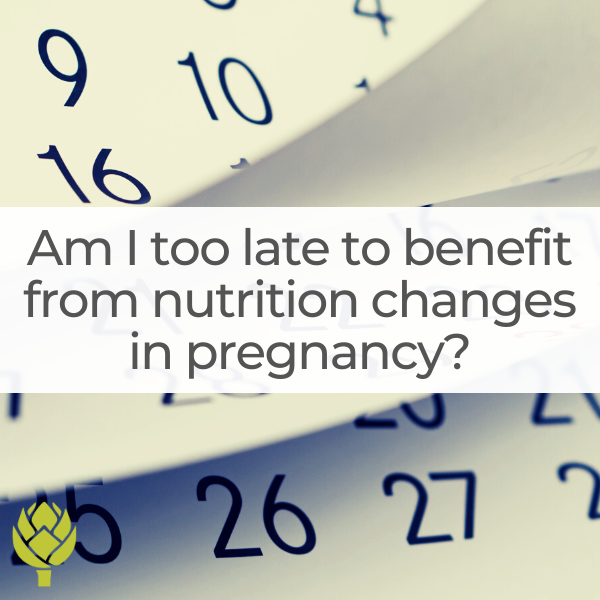

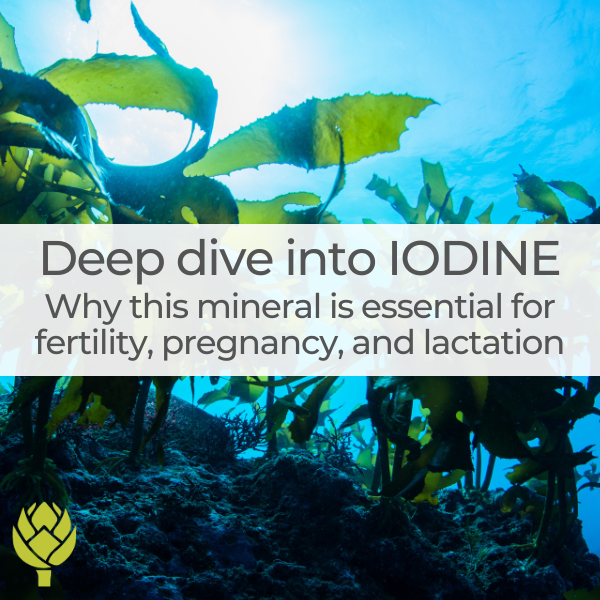
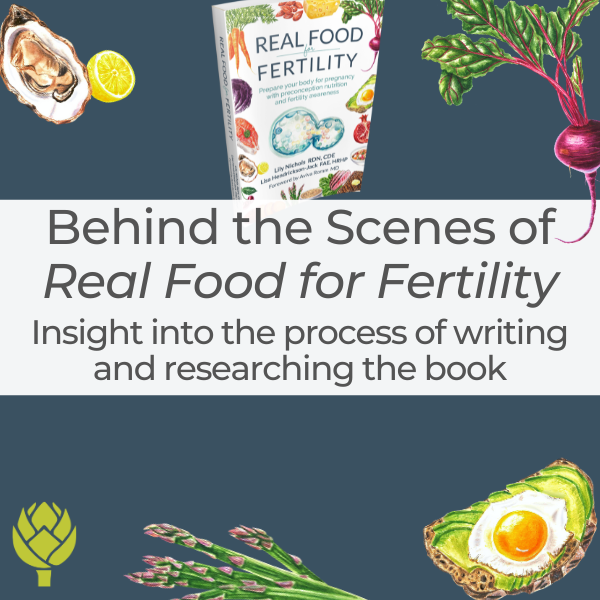
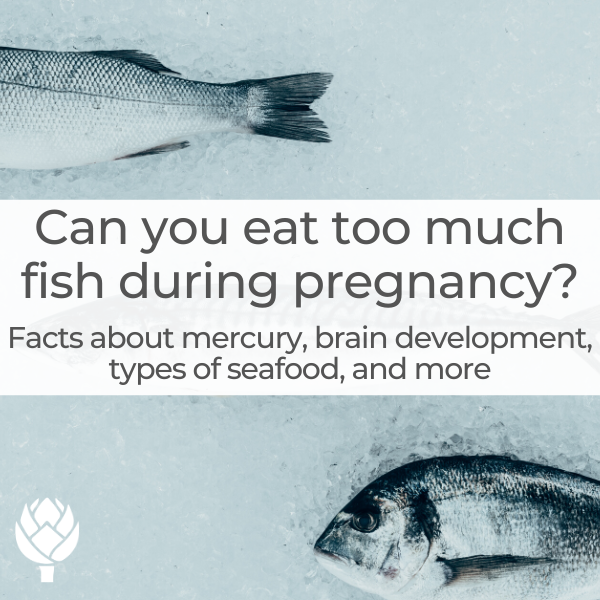
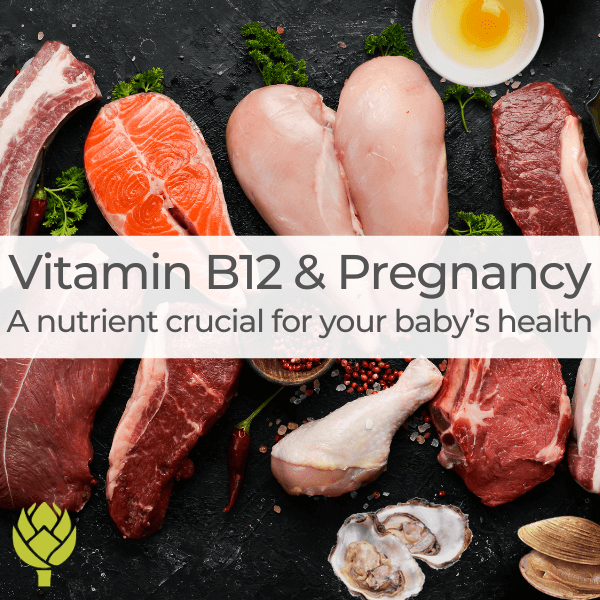



Yikes, DHA supplementation “led to longer gestation by an average of 6 days”? Was this just in women at high risk of preterm birth? I was careful about DHA for brain development and such but ended up delivering at 41 weeks and 3 days, so wouldn’t want my supplementation to extend gestation any further…
There’s no evidence that DHA supplementation leads to higher rates of delivery post expected due dates. A wide range of delivery dates is perfectly normal, by the way. Check out this article from Evidence Based Birth: https://evidencebasedbirth.com/evidence-on-due-dates/
This was such a reassuring read! I’ve always stressed myself out thinking back to the first trimester when it felt like the only thing I could eat was crisps and juice. I was ashamed that I couldn’t do better, but I physically couldn’t. If you’re pregnant or have been through this, you know. It’s not a willpower thing. IT’s just what my body was doing.
I did end up eating better after the 18 week mark and had a perfectly healthy baby who is hitting all his milestones, so I do thing that helped. Your article really helped me come to terms that although my eating during pregnancy wasn’t perfect at every stage, it was not too late to implement healthy eating at about the half way mark.
Thanks, as always, for your amazing work Lily. Real Food for Pregnancy has been my bible!
Such great points Lily. I had no idea that so many of the supplementation trials started later in pregnancy. This is very reassuring because my eating was far from perfect at certain stages when food aversions got the best of me.
I truly thought I was too late to eat healthier and have any positive impact on my pregnancy. I didn’t start my pregnancy the healthiest and then the first trimester was pretty rough. I am borderline for gestational diabetes, but that kinda woke me up and made me start being more proactive about my food choices. I’m happy to hear that still has benefits. Sometimes the information on pregnancy eating feels a bit all or nothing. I really appreciate your balanced approach!
Thank you for this article! I am in week 15 of my second pregnancy and I am so grateful to have discovered you and your work on the Happy Homebirth Podcast. I have been really focusing on eating nutrient-dense foods, with an emphasis on choline and protein because I had preeclampsia in my first pregnancy. Your work is saving and changing lives like mine (and my babies’)! I had been wondering this morning how I could improve my habits or if I could reverse dietary mistakes I had made in the past, and I found this article so reassuring.
So happy to hear that, Maria! Cheers to a continued healthy pregnancy ahead. 🙂
Thank you for this article! I’m 26 weeks and with December and the holidays, have been eating an excessive amount of sugar. Reading the studies of the effects of sugar on potential obesity for my baby as well as brain development has me worried and rabbit-holing. I’ve now ordered your book! 🙂